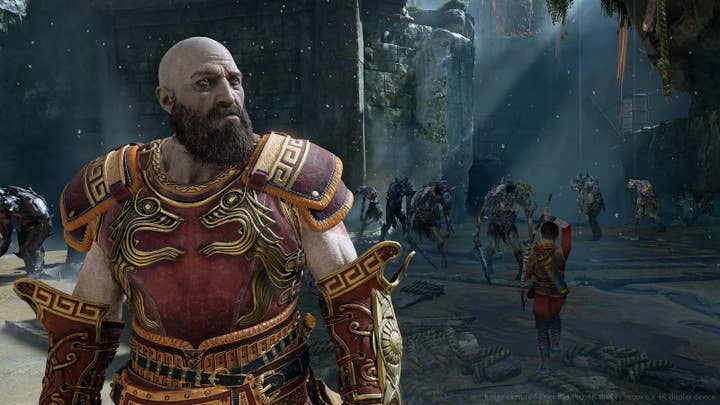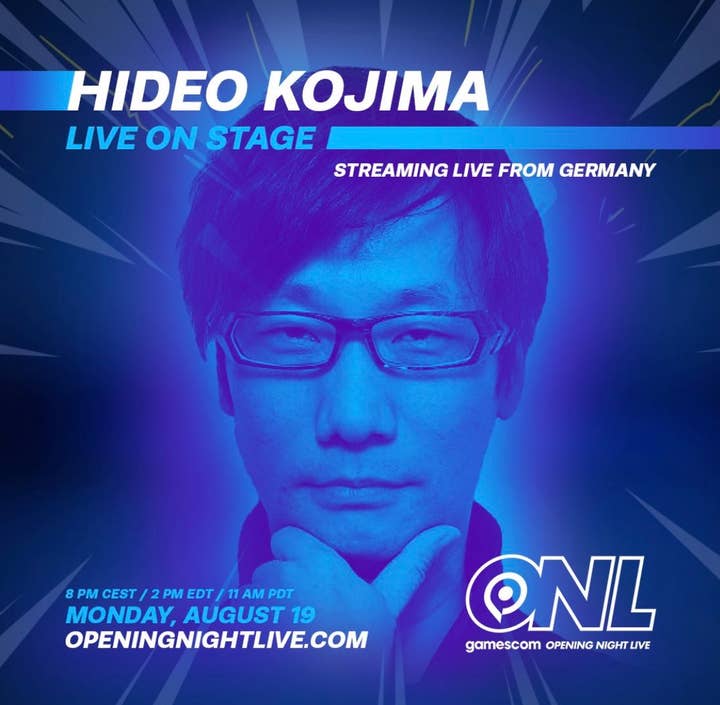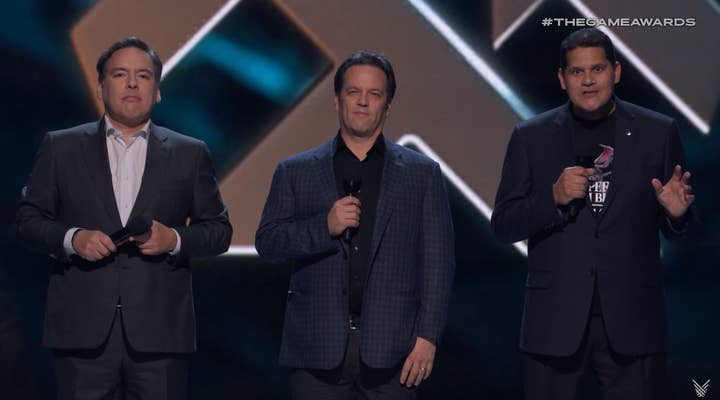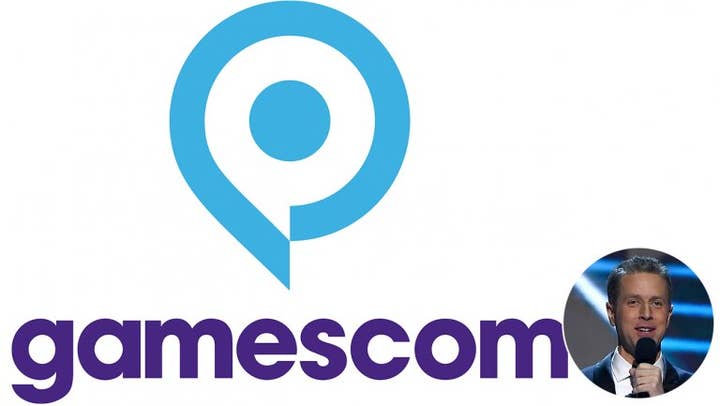Geoff Keighley wants Gamescom Opening Night Live to unite the industry
The event's producer and host on Gamescom's international ambitions, and filling a growing gap created by E3
In the midst of the busiest week of Geoff Keighley's calendar year, the producers of Gamescom called him up and asked for a meeting.
It was December 2018, the week before Keighley's annual awards and announcement showcase, The Game Awards. Keighley made time to sit down in Los Angeles with Felix Falk, the managing director of the German games industry association, Game. Falk had a proposition for him.
Falk told Keighley that the Gamescom producers loved The Game Awards, and that they knew it had a strong European audience already. Because of that, they wanted to enlist his help on their next goal for Gamescom: making it "a little more international," as Keighley puts it.
Those talks led to Gamescom Opening Night Live, a new show debuting on Monday night of Gamescom -- August 19 at 8pm in Cologne, and 11am Pacific Time. The show is a two-hour event featuring Activision, Bungie, EA, Epic Games, Google Stadia, Square Enix, PlayStation, Xbox, and many other major publishers showcasing a mix of new game announcements and new gameplay and trailers for announced games.
Around 1500 people are expected to see the showcase live in a custom-built arena at Gamescom, and the showcase will also be streamed live in nine different languages. Keighley says it's all part of Gamescom's mission to push itself as not just a local, in-person, European show, but also an international show with an online audience.
"Everyone was already participating in Gamescom... I didn't find it hard to get the publishers on board because they were already there"
"I think Gamescom has been trying to figure out a new way to bring the industry together, celebrate games in front of fans, and also broadcast it to the world," Keighley says. "Gamescom is a massive show in Europe, and I think they want to grow their base internationally as well. They came to me and said, 'We see what you do with The Game Awards. It's bringing the industry together, it's broadcasting it to the world, you've been pretty successful with it, is there potentially a way to collaborate?' So we got to talking."
"Bringing the industry together" is a theme we'd return to often in our conversation, especially in light of growing disagreements as to what another major summer games event, E3, should be. Speaking to Falk about Gamescom's goals in bringing Keighley on board for Opening Night Live, he avoids specifically citing E3, but it's clear both from his responses and Keighley's that there's a gap Gamescom is eager to fill. Falk spoke at length about the "impressive list of companies presenting content" at Gamescom, the focus on the international community, and the interest the show has in reaching an online audience this year.
"Gamescom has unique strengths," Falk says in response to my direct question about whether E3's struggles provided an opening for Gamescom to grow. "We address all areas of the games industry. We reach gamers as well as trade visitors and game developers -- no matter if small or big. Also, the size of Gamescom and the fantastic engagement of our community here on site and on all digital platforms show what games are about: a prosperous, huge, diverse and friendly culture. With our new show we are now making these strengths even more visible, worldwide and online on the various platforms."

Keighley is even more candid in his focus on bringing all aspects of the industry together at the same table, and with Gamescom he sees a unique opportunity. Where E3 was missing major industry names this year (such as Sony and Activision), and others (such as EA) were lurking off-site, Gamescom already has just about every major player in the industry at the show already. The challenge of getting people to show up in the first place was already solved.
"Most of the things we do, we do in partnership with publishers," Keighley says. "We have our advisory board for The Game Awards, and the first thing I did was reach out to them and ask if it was interesting to them. What I found was that everyone was already participating in Gamescom. PlayStation, Xbox, Nintendo, EA, Activision, they all said to me, 'We're going to be there, and we're not planning our own press conference, so this could be a unique opportunity to build something there.' I didn't find it hard to get the publishers on board because they were already at Gamescom.
"That's what really excites me. It's the same thing with The Game Awards, where we had the heads of Sony, Microsoft, and Nintendo all walk out onstage at the start of the show. The more I can bring everyone together and put competition aside, the better. And look, it's extremely challenging, and even with this show everyone's competitive. But we get them all to participate in the show and trust us to build it."
"E3 will be the first to admit they're facing a bit of an identity crisis as to what the show is and who it's for"
Though Gamescom and The Game Awards are his focus right now, Keighley adds that he's currently working with E3 as well to help it solve some of its challenges, though he can't say specifically what that would look like. He's already a part of E3 with E3 Colosseum and the YouTube Live @ E3 show, but he indicates his past goals of bringing everyone to the same table are actively being applied to the US trade-show-turned-consumer-show as well.
"E3 has a lot of challenges it faces and I'm trying to help them navigate that, and help publishers navigate what the best approach to consumer events and trade shows is. With The Game Awards, we've found a lot of success in our digital broadcast model. Gamescom has done a really good job building a consumer-oriented show with a lot of people. And E3 I think will be the first to admit they're facing a bit of an identity crisis as to what the show is and who it's for. We've offered to help them continue to navigate that, and I have a lot of ideas of where I would take E3 if we took a more active role in shaping what that show could be.
"But I think for E3, everyone has to come back to the table and be a part of it. You need everyone to participate, and I'm proud that The Game Awards and Gamescom [are events that] everyone actively participates in. I'm proud to be building events where we can get everyone together, and I've told the board of the ESA that we want to help everyone come together around a big industry event in the summer, whether that's E3 or something new. Gamescom looks particularly strong this year because they have everyone aligned."
Opening Night Live isn't the first time Gamescom has seen a major game announcement showcase, but it is the first time in a relatively long time. And it does seem to be a challenging part of the year to have such a showcase, with E3 just two months past, most major holiday season releases already announced, and December's Game Awards coming up on the tail of that with more announcements. That's not to mention all the publisher-specific showcases year-round, like Nintendo Directs, Inside Xbox, and the (admittedly absent of late) PSX. Even with all the major publishers present, surely it would be a challenge to find enough new content to entice a global online audience?

"Gamescom has gone through an interesting evolution," says Keighley. "Many years ago they did have pretty big press conferences from EA, Xbox, PlayStation. They would do days of press conferences. I think the general view is that it was too close to E3 to do another major two-hour showcase of content -- there's just not enough new stuff.
"What they found is that it's hard to do that, but what we can do is this one thing where we give every publisher five to ten minutes to showcase something and update people. It's the right size for the right time of year."
Keighley says that this is helped by the fact that Opening Night Live is not intended to be solely new announcements. There will also be first looks at gameplay from announced games, and deep dives into games coming up over the holidays. The show's primary focus, he says, is "big announced games showing new content." But there will be surprises for next year, too, as well as a number of indie titles making an appearance alongside the industry's biggest names.
"I don't make the games, and the thing that terrifies me every year is that it's up to developers and publishers to bring us games we can announce"
"A couple of years ago we tried a thing with YouTube where we did a weekly showcase of games, and what we found is that there's not enough content constantly to warrant these big moments," he says. "The balance is always that you have to go away to come back and do something big. You can only do it a couple of times a year. People say,'The Game Awards is massive, why don't you do this once a month?' And no, you have to gather the news and give people a reason to care about something.
"When people do a press conference, there's such an expectation of blockbuster, breaking news. That's part of the reason I think Sony [stayed out of] E3 this year -- they had [already] announced a lot of its games coming for PlayStation 4. It's the same thing we face with The Game Awards every year. We have a reputation for amazing surprises, but I don't make the games, and the thing that terrifies me every year is that it's up to developers and publishers to bring us games we can announce. There may come a year where there's not enough big surprises to announce. Is that our fault?
"It's a challenge, and that's the thing publishers face with Gamescom. To do another press conference is hard. But this is a return to the idea of doing something online that a global audience can participate in to grow the Gamescom brand."
And Keighley isn't worried about potential competition from his own show in December, either. Indeed, he says that this year's Game Awards announcement roster is "the biggest yet" and that most of the titles are already "pretty much set."
"We're in an enviable position with The Game Awards now, where people are planning a year or more out for massive new game announcements and surprises. I haven't found [Gamescom] to be competitive with what we're doing at The Game Awards. It's two different opportunities at two different points in time. If anything it helps us, because we're now in conversation with publishers about E3, Gamescom, and The Game Awards together, so we all work together to figure out the right place for the right games."

The Game Awards and Gamescom Opening Night Live work hand-in-hand in a number of ways, even though Keighley says they aren't technically under any kind of umbrella "branding" beyond his own name. A number of the same producers are involved in both shows, and he intends for Opening Night Live to become an annual event, just like The Game Awards. Many of his goals for this show, including international reach and unification, match up with the goals he told me he had for The Game Awards last year. And he also sees it as a way to benefit both The Game Awards audience and Gamescom by entrenching the ideas behind both shows more deeply across international borders.
"Something like this fits into a broader mission, which is connecting gamers around the world and bringing more attention to the industry"
"I always feel bad when we do The Game Awards and the show is at 2am or 3am in Europe and people stay up for it," he says. "So I wanted to come over here and do something for all the European folks, thank them for staying up watching Game Awards, and building our visibility of that brand in Europe. The Game Awards is seen as a US show when it's not really. I think 52% of our audience is in the US, but the rest is outside. It's important for us to do more globally, to let people know we're a global brand.
"I came out of a television world, where we were thinking very domestically about US TV ratings and we were judged purely on that. Now as I travel around the world, what I find is that there is so much interest in the show internationally. It's heartening to see.
"And Gamescom, speaking objectively, has been a European show. I think the thing they want to address is they need to be even more global. E3 is a very global show just because it's been broadcast and seen around the world for 20-plus years, so I think Gamescom has everyone there and now the piece they need is a big spectacle showcase."
But that does put his Gamescom show in an odd position, at least from a standpoint of personal branding. Since it isn't under any particular "The Game Awards" header, the main unifying name between the two events is their host and producer -- Geoff Keighley himself. The shows are intrinsically tied with his personal brand, and he mentioned multiple times during the conversation that putting on something like The Game Awards is a year-long, labor-intensive endeavor -- one that may not be disrupted too dramatically by something like Gamescom, but that gets increasingly more complex when you add E3 and anything else onto it. What, then, is his ultimate goal in all this, both as a person and as a 'brand' of sorts?
"The endgame is not particularly strategic," he replies. "It's more opportunistic. It's really whatever the publishers and I collectively think is interesting to build. I'm very conscious that The Game Awards is a huge honor, and I intend to do that for the rest of my life. I never want to lose focus on that. I struggle with taking on these other projects because sometimes they divert energy from the awards. It's a growing business, we're doubling our audience year-after-year, I don't want to take my eye off the ball.
"Strategically, something like this fits into a broader mission, which is connecting gamers around the world and bringing more attention to the industry. That's something my career has always been about, but I'm interested in doing other things. I'm working on another Final Hours story, we just did a show for Epic and Fortnite, a Game Jam show using Fortnite Creative Mode. I'm being strategic about things we take on, but longer term I think we may do more of these kind of things throughout the year."

